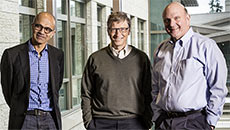Heard of green diesel? That could be the fuel for your vehicle in near future.
A team including two Indian-American scientists at the US Department of Energy’s Ames Laboratory has created biofuel refining technology that is faster, cleaner and cheaper.
The scientists developed a nanoparticle that is able to perform two processing functions at once for the production of “green diesel”.
Green diesel is an alternative fuel created from the hydrogenation of oils from renewable feedstocks like algae.
“By designing multifunctional nanoparticles and focusing on green diesel rather than biodiesel, we can combine multiple processes into one that is faster and cleaner,” explained Kapil Kandel from Ames Lab research group, which included Umesh Chaudhary and Igor Slowing.
“Conventionally, when you are producing biodiesel from a feedstock that is rich in free fatty acids like microalgae oil, you must first separate the fatty acids that can ruin the effectiveness of the catalyst, and then you can perform the catalytic reactions that produce the fuel,” Slowing added.
Contrary to biodiesel, green diesel is produced by hydrogenation of fats and oils, and its chemical composition is very similar to that of petroleum-based diesel.
Using nickel for the fuel conversion alone, the process resulted in too strong of a reaction, with hydrocarbon chains that had broken down.
The process, called “cracking”, created a product that held less potential as a fuel.
But Slowing, along with Kandel and Chaudhary, took the process further by using iron as the catalyst.
Iron is 100 times cheaper than nickel.
Using iron improved the end product even further, giving a faster conversion and also reducing the loss of CO2 in the process.
The process is discussed in a paper published in the Journal of Catalysis.





